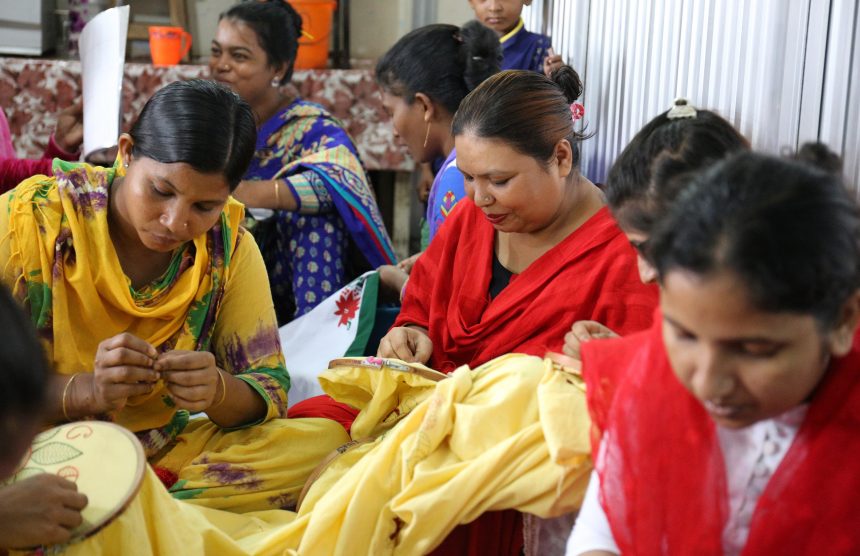January is Human Trafficking Awareness Month.
Photo Credit: Jennifer Diaz, Bangladesh
Scripture
Mark 12:30, 31
Decorations
Print stories and photos from the Others—Trade for Hope Facebook and Website pages. Others Trade for Hope: https://www.tradeforhope.com.
Activities
Host an Others Party in a Box (contact information: April.foster@use.salvationarmy.org) Included in this kit are: decoration tips, items to be purchased to support the women and men who are working for a better life, stories of hope and details on how to run an Others Party.
Refreshments
Serve Fair Trade chocolates, fruit and nut bar, cookie mixes, oat and grain bars, coffee and tea. Explain why you are serving these items. Fair Trade is a social movement whose goal is to help producers in developing countries achieve better trading conditions and to promote sustainable farming. Additional information about Fair Trade food can be found on the Internet.
Human Trafficking Awareness Month
What is Human Trafficking? It is modern–day slavery that involves the use of force, fraud, or coercion to obtain some type of labor or commercial sex act. Human trafficking is a hidden crime as victims rarely come forward to seek help because of language barriers, fear of the traffickers and/or fear of law enforcement.
Traffickers look for people who are susceptible for a variety of reasons, including psychological or emotional vulnerability, economic hardship, lack of a social safety net, natural disasters, or political instability. The trauma caused by the traffickers can be so great that many may not identify themselves as victims or ask for help, even in highly public settings.
Warning Signs
Signs of physical abuse • Deprived of food, water or medical care • Restricted communication • Too many occupants in one residence • Individuals are rarely seen outside of the residence • Unable to communicate • Shows evidence of intimidation or fear • Not allowed to socialize or attend religious services • Always accompanied when outside the residence • Outside locks on doors and windows to keep people in • Lacks ID/documentation
Questions to Ask
If you suspect that someone is a victim of human trafficking the following questions are helpful in making that determination:
Can you leave your job if you want to • Can you come and go as you please? • Have you or your family been threatened? • What are your working and living conditions like? • Where do you sleep and eat? • Do you have to ask permission to eat, sleep, go to the bathroom? • Are there locks on your doors or windows so you cannot get out? • Has your identification been taken away from you? • Does someone prohibit you from socializing?
What Can We Do?
If you suspect someone is the victim of human trafficking, call the National Human Trafficking Resource Center: 1–888–373–7888 (a 24–hour, toll free crisis line). As this can be so overwhelming, remember to bring it to God.
Prayer for Victims
Check the following prayer for Victims of Human Trafficking 2016 by Samson Nangole (Kenya East)
Resources:
To find posters, detailed information, statistics and stories please check out these sites:
- http://www.salvationarmy.org/ihq/antitrafficking
- http://faastinternational.org/#/toolkits
- https://polarisproject.org/resources
- https://sajustice.us/
- https://traffickfree.com
- https://enditmovement.com
- https://fightnewdrug.com
- https://www.dhs.gov/blue-campaign
- https://humantraffickinghotline.org
Who Is My Neighbor?
“And you must love the Lord your God with all your heart, all your soul, all your mind, and all your strength.’ The second is equally important: ‘Love your neighbor as yourself.’ No other commandment is greater than these” (Mark 12:30–32).
It is important to have a close, deep, personal relationship with the Lord. The verse from Mark says to give all that we are—heart, soul, mind and strength—to our relationship with Him. This is the greatest commandment. As we consider our relationship with the Lord we are challenged with the second portion of this commandment, “Love your neighbor as yourself.”
When we look at human trafficking, we need to ask, “who then is our neighbor?” It is easy to think that it concerns someone far away on the other side of the world. We understand human trafficking happens in third world countries or faraway places. However, human trafficking is happening right under our noses. It is the college girl next door, the person at the nail salon, the gas attendant at the local gas station, the workers at the massage parlor, the women caught in pornography or at the local peep shows, the men and women cleaning houses next door, the girls on the streets, the foster child or runaway looking for a safe place.
In the story of Hagar in the Bible we hear of a maidservant who has been used to bring a child into the world for Abraham and Sarah. Hagar runs away while she is pregnant because of mistreatment by Sarah. As Hagar is leaving the only home she knows she has an encounter with God. “Thereafter, Hagar used another name to refer to the Lord, who had spoken to her. She said, “You are the God who sees me.” She also said, “Have I truly seen the One who sees me?” (Gen. 16:13). Hagar recognizes that God sees her. This is what love looks like.
I had an opportunity to go to Bangladesh and to visit Human Trafficking projects and brothels with Others—Trade for Hope. I found women who no longer wanted to be defined by their past. Instead they wanted to share how their lives were restored and renewed with pride and dignity. They wanted to be seen for who they were becoming. My heart was stirred with hope and joy.
We have an opportunity to show love by “seeing” others. I pray that we will ask the Lord to open our eyes to our neighbor. That God will show us how to love as He loves. We are called to see, to bring hope, to bring presence, and to bring Jesus. Help us Lord today.

